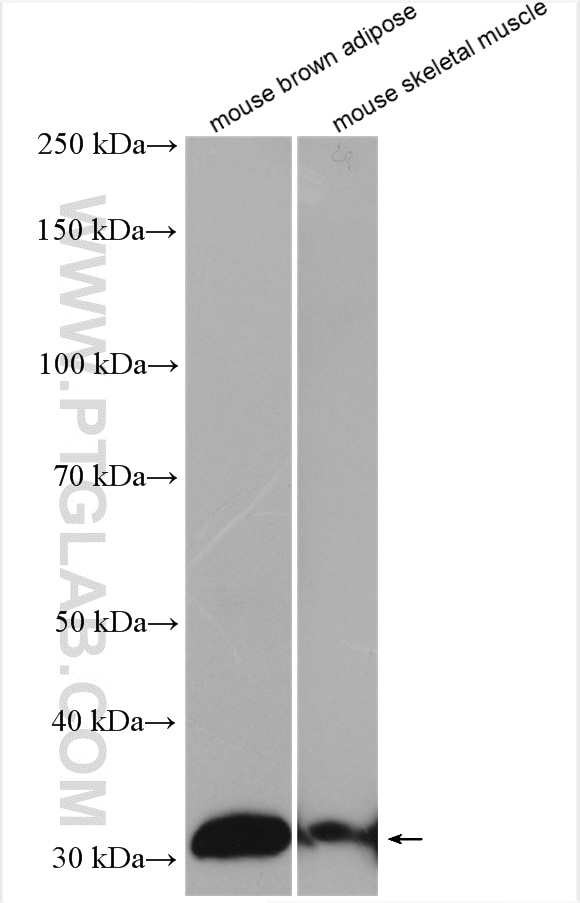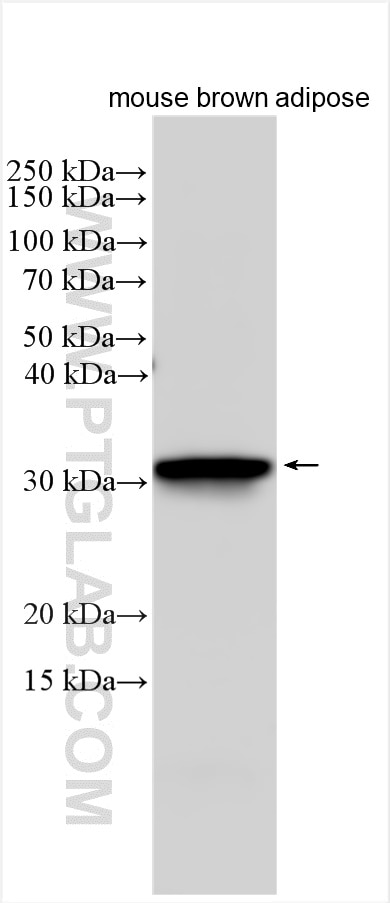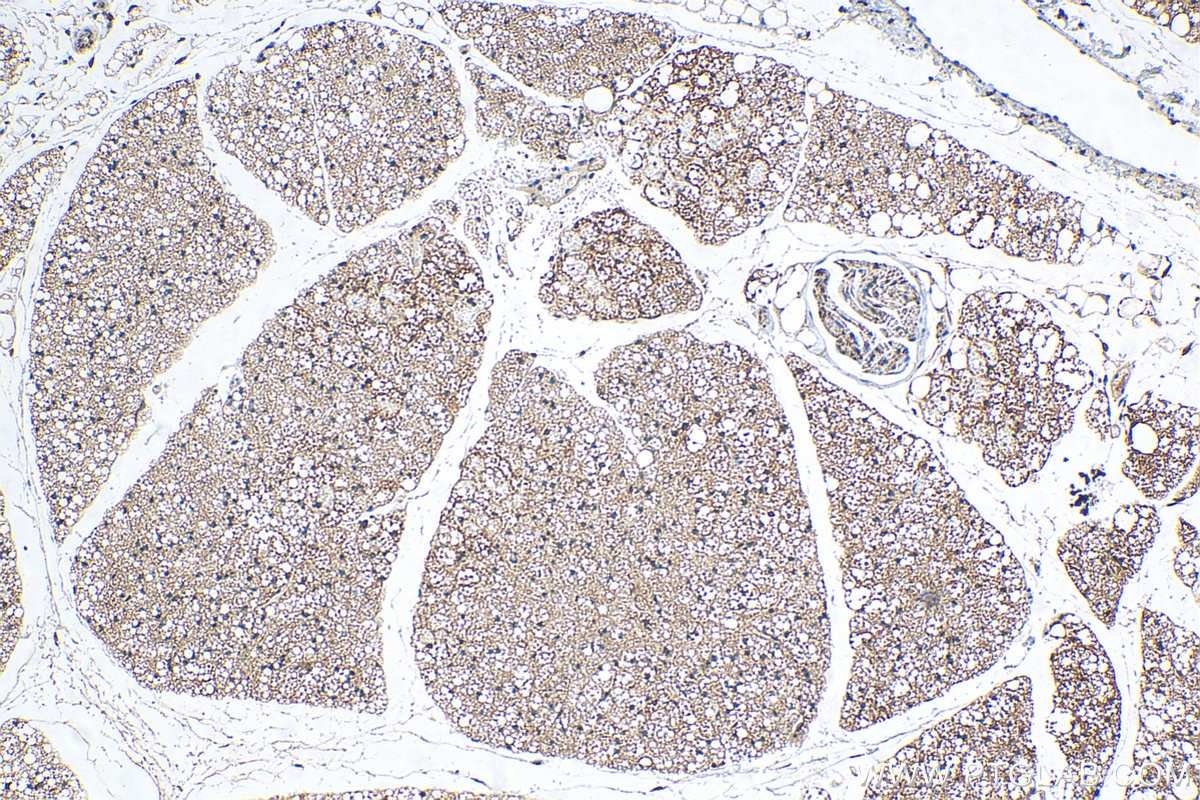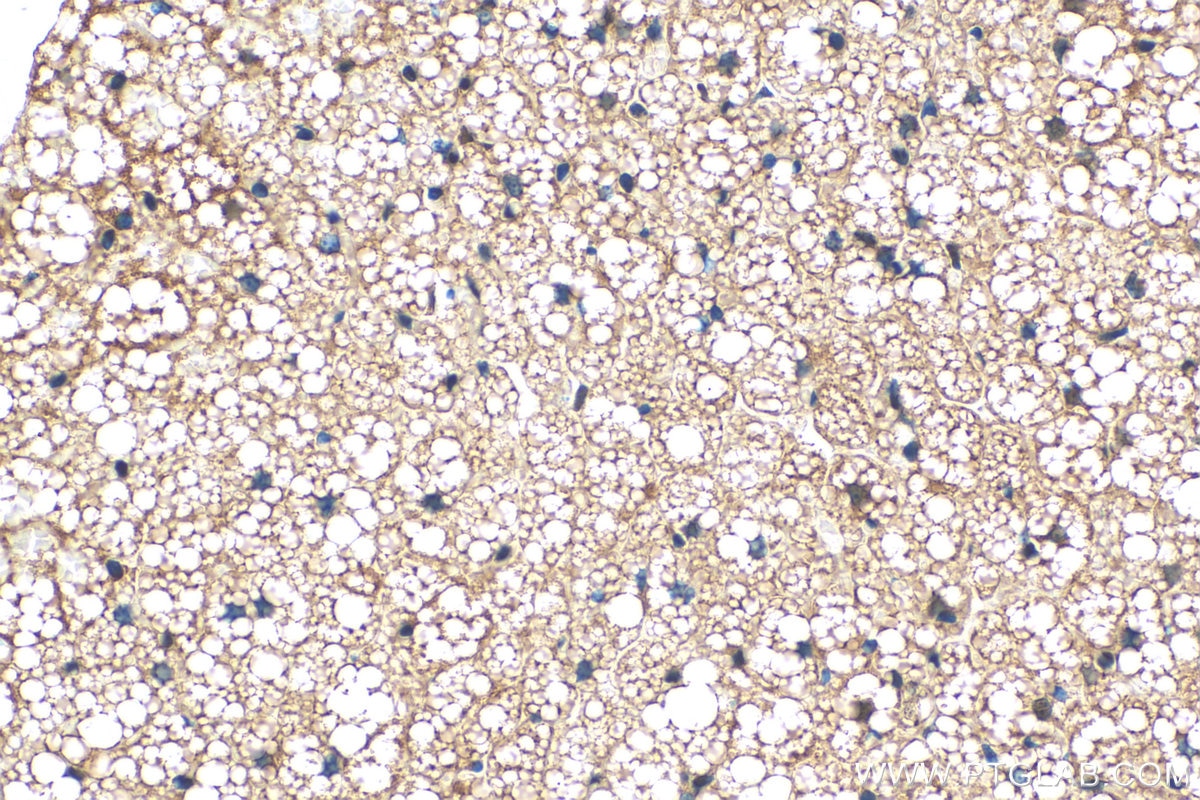Tested Applications
| Positive WB detected in | mouse brown adipose tissue, mouse skeletal muscle tissue |
| Positive IHC detected in | mouse brown adipose tissue Note: suggested antigen retrieval with TE buffer pH 9.0; (*) Alternatively, antigen retrieval may be performed with citrate buffer pH 6.0 |
Recommended dilution
| Application | Dilution |
|---|---|
| Western Blot (WB) | WB : 1:1000-1:6000 |
| Immunohistochemistry (IHC) | IHC : 1:50-1:500 |
| It is recommended that this reagent should be titrated in each testing system to obtain optimal results. | |
| Sample-dependent, Check data in validation data gallery. | |
Published Applications
| KD/KO | See 3 publications below |
| WB | See 114 publications below |
| IHC | See 40 publications below |
| IF | See 14 publications below |
Product Information
23673-1-AP targets UCP1 in WB, IHC, IF, ELISA applications and shows reactivity with human, mouse samples.
| Tested Reactivity | human, mouse |
| Cited Reactivity | human, mouse, rat, bovine, hamster, goat |
| Host / Isotype | Rabbit / IgG |
| Class | Polyclonal |
| Type | Antibody |
| Immunogen |
CatNo: Ag20388 Product name: Recombinant human UCP1 protein Source: e coli.-derived, PET28a Tag: 6*His Domain: 1-307 aa of BC098168 Sequence: MGGLTASDVHPTLGVQLFSAGIAACLADVITFPLDTAKVRLQVQGECPTSSVIRYKGVLGTITAVVKTEGRMKLYSGLPAGLQRQISSASLRIGLYDTVQEFLTAGKETAPSLGSKILAGLTTGGVAVFIGQPTEVVKVRLQAQSHLHGIKPRYTGTYNAYRIIATTEGLTGLWKGTTPNLMRSVIINCTELVTYDLMKEAFVKNNILADDVPCHLVSALIAGFCATAMSSPVDVVKTRFINSPPGQYKSVPNCAMKVFTNEGPTAFFKGLVPSFLRLGSWNVIMFVCFEQLKRELSKSRQTMDCAT Predict reactive species |
| Full Name | uncoupling protein 1 (mitochondrial, proton carrier) |
| Calculated Molecular Weight | 307 aa, 33 kDa |
| Observed Molecular Weight | 33 kDa |
| GenBank Accession Number | BC098168 |
| Gene Symbol | UCP1 |
| Gene ID (NCBI) | 7350 |
| RRID | AB_2828003 |
| Conjugate | Unconjugated |
| Form | Liquid |
| Purification Method | Antigen affinity purification |
| UNIPROT ID | P25874 |
| Storage Buffer | PBS with 0.02% sodium azide and 50% glycerol, pH 7.3. |
| Storage Conditions | Store at -20°C. Stable for one year after shipment. Aliquoting is unnecessary for -20oC storage. 20ul sizes contain 0.1% BSA. |
Background Information
UCP-1 (Mitochondrial uncoupling protein 1), is a mitochondrial transporter protein that creates proton leaks across the inner mitochondrial membrane, thus uncoupling oxidative phosphorylation from ATP synthesis. It has been identified a key molecule for metabolic thermogenesis to avoid an excess of fat accumulation. UCP-1 expression is usually restricted to brown adipose when induced by cold exposure and thyroid hormone.
Protocols
| Product Specific Protocols | |
|---|---|
| IHC protocol for UCP1 antibody 23673-1-AP | Download protocol |
| WB protocol for UCP1 antibody 23673-1-AP | Download protocol |
| Standard Protocols | |
|---|---|
| Click here to view our Standard Protocols |
Publications
| Species | Application | Title |
|---|---|---|
Nature Feeding induces cholesterol biosynthesis via the mTORC1-USP20-HMGCR axis.
| ||
Nat Commun Improvement of obesity-associated disorders by a small-molecule drug targeting mitochondria of adipose tissue macrophages. | ||
Mol Biol Evol Functional Attenuation of UCP1 as the Potential Mechanism for Thickened Blubber Layer in Cetaceans | ||
Diabetes Exosomes From Adipose-Derived Stem Cells Attenuate Adipose Inflammation and Obesity Through Polarizing M2 Macrophages and Beiging in White Adipose Tissues. | ||
Cell Prolif Procyanidin B2 improves developmental capacity of bovine oocytes via promoting PPARγ/UCP1-mediated uncoupling lipid catabolism during in vitro maturation | ||
Int J Biol Macromol Structural characterization and alleviative effects of novel polysaccharides from Artemisia sphaerocephala Krasch seed on obese mice by regulating gut microbiota |
Reviews
The reviews below have been submitted by verified Proteintech customers who received an incentive for providing their feedback.
FH Mi (Verified Customer) (03-06-2023) | It works well in human brown adipocyte cells. Although we got several non-specific bands, the band at the expected size was very clear.
|










